On October 27, 2023, the Council committed to Crossroads to Justice: Minnesota's New Pathways to Housing, Racial and Health Justice for People Facing Homelessness. The plan is the culmination of a year-and-a-half-long process that was co-led by 10 paid Justice Consultants, all people with lived experience of homelessness representing different experiences and different parts of the state. In 2022, after the shared experience of working with partners across Minnesota to protect and support people facing homelessness during the pandemic, while confronting the racism and injustice in our systems following the murder of George Floyd, Governor Walz and Lieutenant Governor Flanagan tasked the Minnesota Interagency Council on Homelessness with developing a strategic plan focused on justice. They sought a housing, racial and health justice approach for people facing homelessness in Minnesota to guide the work of state government on this issue for the remainder of their second term.
Crossroads to Justice Strategic Plan
Phase 1
Completed June 2022
Centering the voices of those who have experienced homelessness, Rainbow Research is leading a process to co-develop a unified, operation definition for what we mean when we say housing, racial, and health justice for people experiencing homelessness.
Phase 2
Completed October 2023
Using the operation definition from Phase 1 to drive specific strategies, actions, and commitments that the Council and other partners could pursue as a part of the strategic plan. The Council will adopt specific actions in this phase.
Phase 3
Ongoing
Implement, monitor and iteratively refine the plan.
The Council accepted several adjustments to the plan on June 11, 2025. These adjustments clarify existing Actions and reflect additional commitments that have emerged as agencies conduct the work of the plan.
Utilizing the consultants’ expertise, statewide workshops, conversations with partners, participant feedback from regular webinars, and multiple agencies’ staff expertise, the Council and the Justice Consultants developed five bold results that will drive significant movement towards housing, racial and health justice.
To achieve these bold results, Council agencies and the Justice Consultants worked together to identify the highest impact strategies and actions the Council will pursue. The strategies and actions listed at the end of the plan document do not name everything state agencies are already doing related to housing stability and homelessness, nor do they represent everything that must be done. Rather, these strategies and actions were chosen as the highest impact opportunities to pursue at this moment. The impact of these efforts will be continuously monitored to see if, and when, adjustments are needed.
Result 1: Collaborate and Co-Lead with Impacted Communities
Council agencies will collaborate and co-lead with impacted communities that have been historically oppressed and excluded such as Black, Brown and people of color, poor/low income, LGBTQIA2S+, people with disabilities, older adults, foreign-born, and people who have faced homelessness and Tribal Nations to implement the action plan on housing, racial and health justice.
Strategy 1: Every council agency commits to working with people with lived experience of homelessness to guide policies, programs and agency direction.
Strategy 2: Ensure equitable funding opportunities for Tribal Nations and communities across the state.
Strategy 3: Provide easy to understand information on programs, funding and decision making to ensure transparency and accountability in state government.
Result 2: Prevention
Homelessness is prevented whenever possible, and services and supports are provided to ensure no one returns to homelessness.
Strategy 1: Improve access to resources for households to sustain their housing.
Strategy 2: Support people in transitions so they do not leave government funded or operated systems into homelessness.
Strategy 3: Use data to target resources more effectively.
Result 3: Robust Crisis Response
A robust crisis response geared towards housing outcomes supports people staying outside, in emergency shelters, and in community.
Strategy 1: Invest in and support additional outreach responses that reach people wherever they are and help make connections to housing providers.
Strategy 2: Increase safe indoor crisis options statewide that are low barrier, harm reduction, and culturally responsive to meet people’s needs.
Strategy 3: Support a consistent and systemic approach across jurisdictions to improve outcomes for people sleeping in encampments.
Result 4: Housing Options
People facing homelessness have access to housing options that meet their needs and honor their choices.
Strategy 1: Fund and develop a variety of housing options with fewer restrictions and barriers.
Strategy 2: Increase access to rental assistance and vouchers.
Strategy 3: Improve navigation to get people into housing.
Strategy 4: Increase access to supportive services to sustain housing.
Result 5: Health and Public Health
Homelessness is treated as a crucial health and public health crisis wherever it occurs.
Strategy 1: Create a comprehensive, trauma-informed and culturally responsive continuum of care for people facing homelessness with behavioral health needs, which includes mental health and substance use.
Strategy 2: Increase capacity, access and use of quality, culturally responsive health resources including physical health, mental health, substance use supports, sexual health, and spiritual health.
Strategy 3: Establish a structure and protocols to prevent, mitigate, and respond to infectious disease outbreaks for people facing homelessness.
This plan was developed to drive action as well as to promote continuous learning and improvement over the next four years. The Council will measure progress, adjust actions as needed for greater impact, and communicate regularly with partners across the state.
The implementation of this plan will be co-led and co-monitored by a team of Implementation Consultants with lived expertise.
Each action item will have a lead agency staff who will be responsible for managing the details and ongoing work needed to complete the action. The Council staff will regularly bring together agency staff to work collaboratively and monitor how the action items are achieving the strategies under each of the five results. Additionally, a senior leadership and newly formed interagency equity team will support agency staff, problem solve and remove barriers that may be impeding progress and ensure equity is central to all pieces of implementation.
Updates on the implementation progress will be added soon.
Overall Metric: The number of Minnesotans experiencing homelessness (Goal: 15 percent reduction by Dec. 2026)
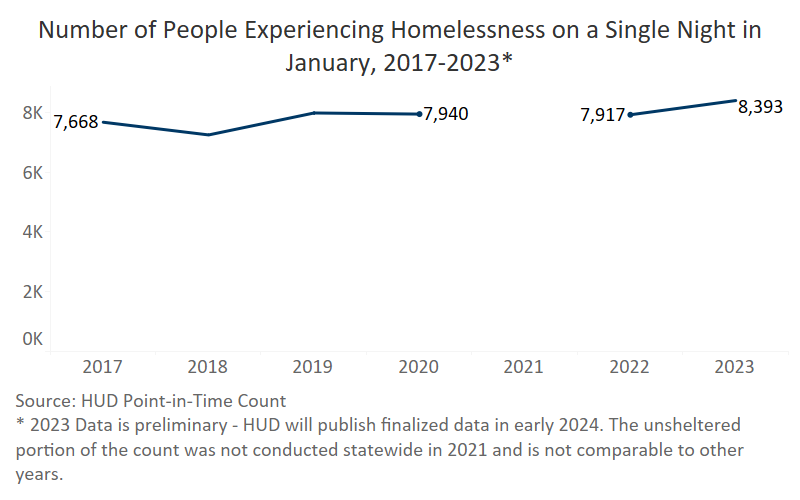
Overall Metric: A reduction in the inequities of who experiences homelessness,
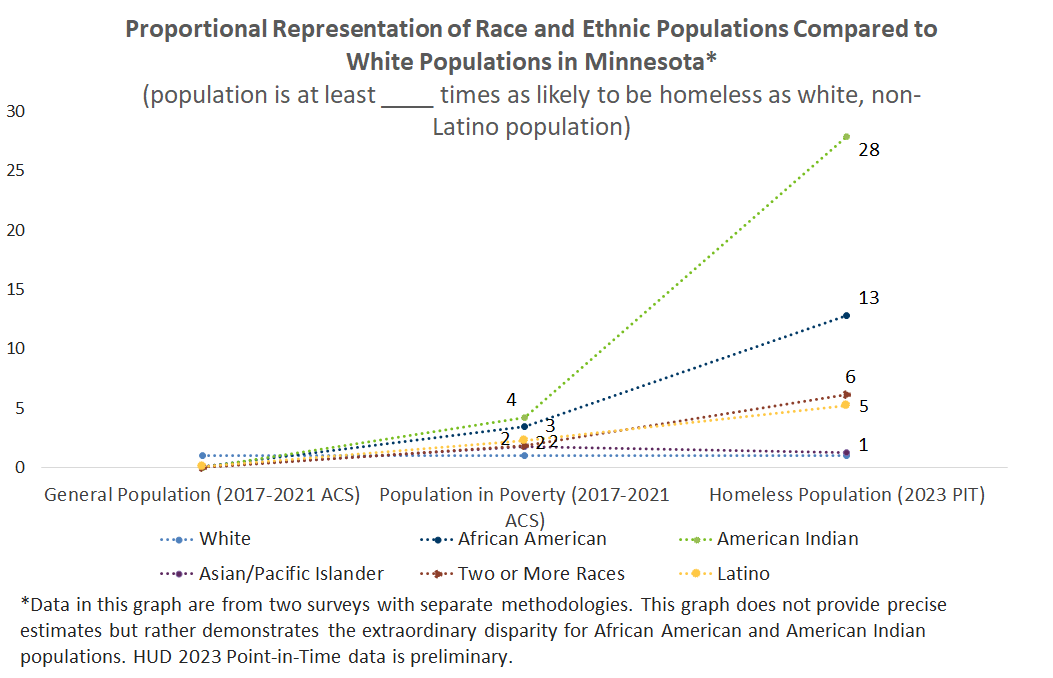
Result 1
Quarterly report at Council meetings from each Council agency that describes the ways they are working with community to meaningfully make decisions to guide the implementation of this plan which is inclusive of hiring people with lived experience, going out to the community, and engaging consultants.
No baseline data. This is new data that will be developed as part of implementation.
Result 2: Reduction in the number of people entering homelessness.
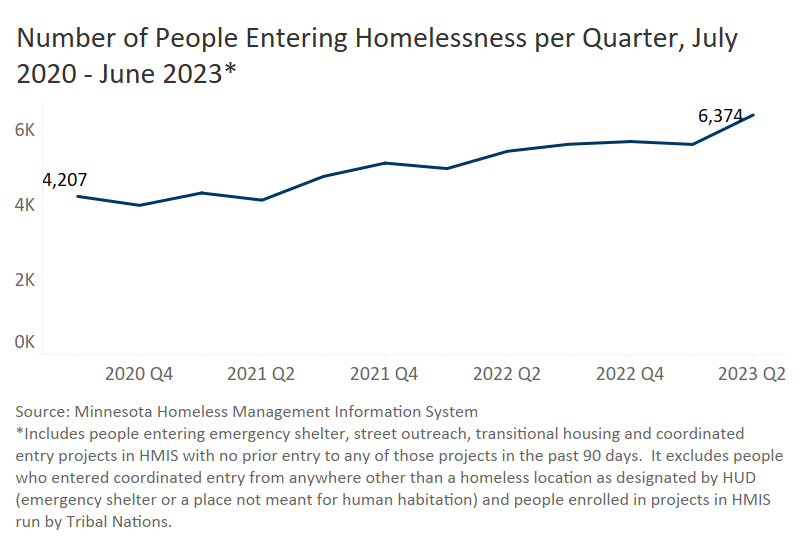
Result 3: Reduction in the number of people sleeping outside.
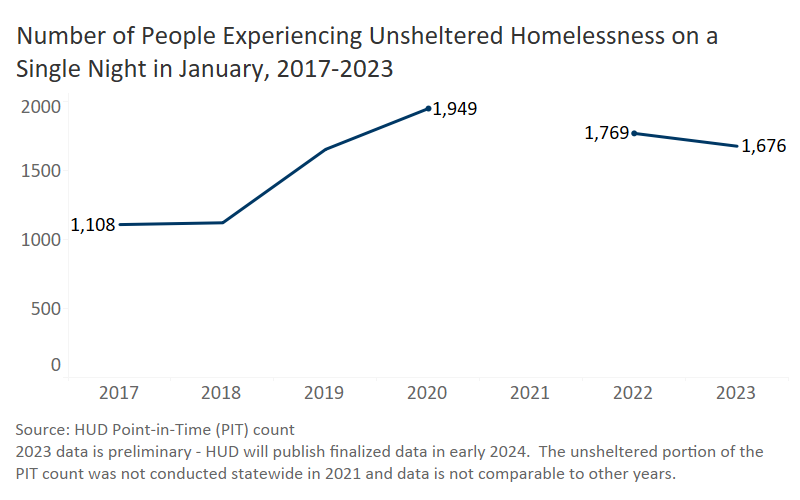
Result 3 & 4: Increases in the number of people exiting homelessness into housing
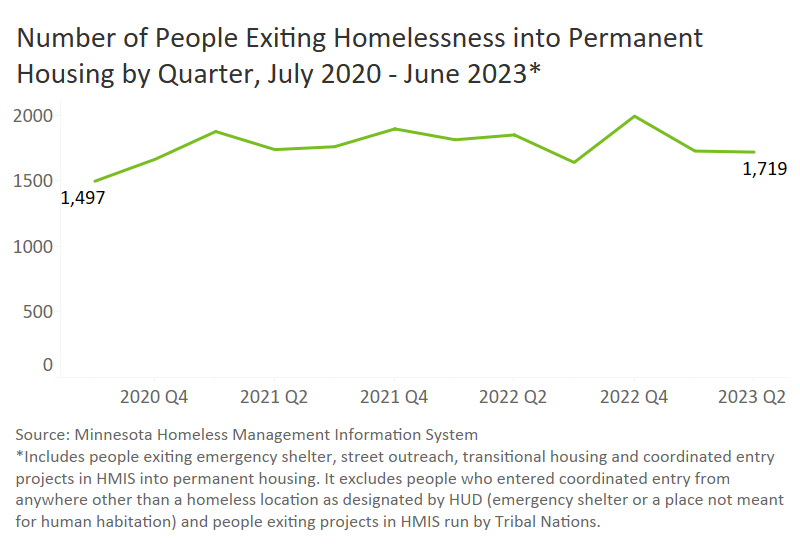
Result 3 & 4: Increases in the number of people exiting homelessness into housing
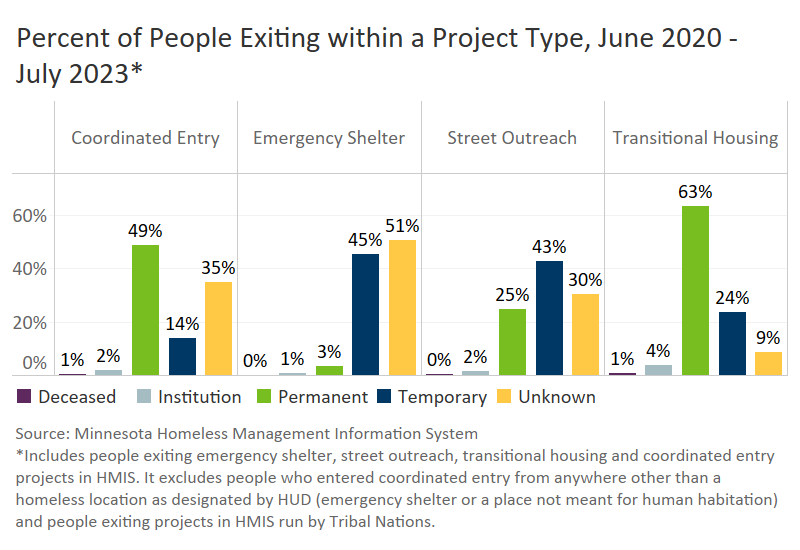
Note: Roughly half of all people exiting homeless projects in HMIS exit to an unknown destination as program staff do not always know where participants go when they exit a program. However, this is an important measure to capture as it is our best approximation of identifying if people obtain permanent housing after engaging in services.
Result 5: Reduction in the disparities in mortality and morbidity and improvements in the health of people facing homelessness
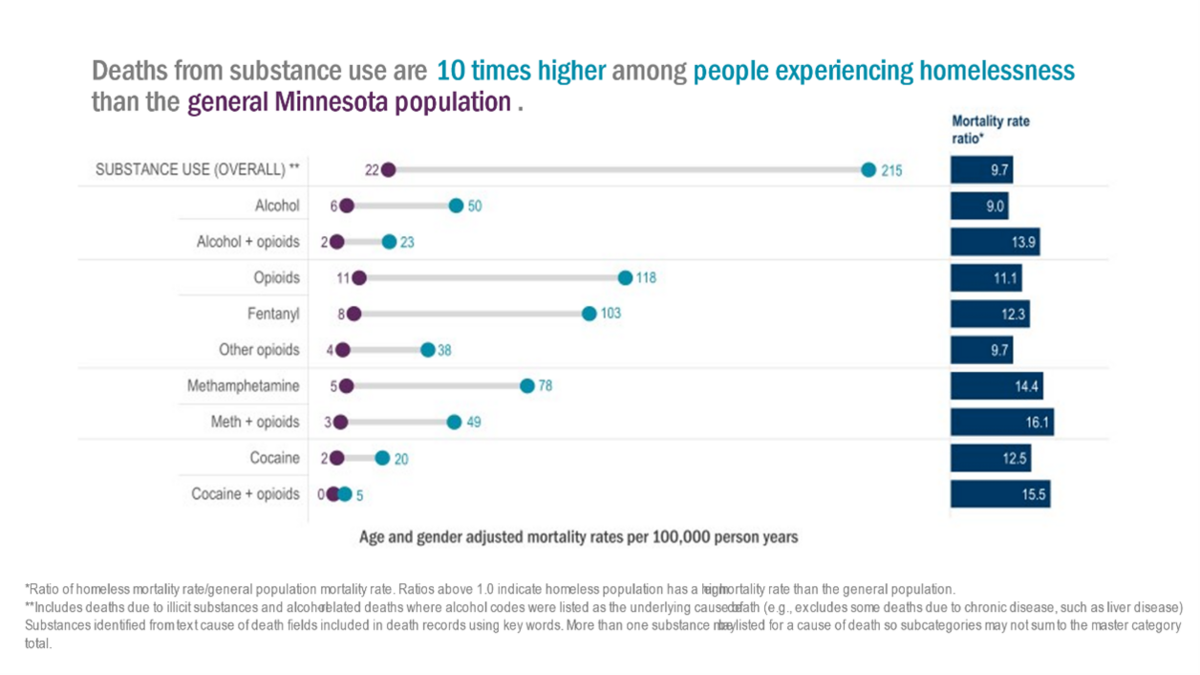
Note: MDH will monitor progress in reducing substance-use related deaths among people facing homelessness, using as our baseline the data below from the Minnesota Homeless Mortality Report, 2017-2021. As the plan progresses, we will look to expand this analysis to other mortality and morbidity measures.
Crossroads to Justice is being co-implemented with 14 paid Implementation Consultants, all people with lived experience of homelessness representing different experiences and different parts of the state.
Get to know the Implementation Consultants by reading their biographies:
